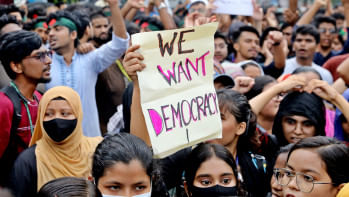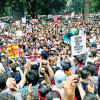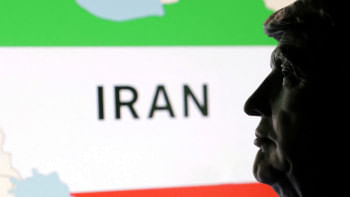For true democracy, we need checks and balances of power

Bangladesh is a country of around 170 million people, with more than 20 million residing in the capital, Dhaka, alone. Yet, only 151-300 members of parliament representing the ruling party decide our fate in parliament. They are all members of a single party led by one individual: the party leader. There is no distribution of power or checks and balances—there's only consolidation of power. Due to our people's loyalty to two political families, the only two parties to be in power since 1991 have been led by and remained completely dependent on two individuals from those two families, each of whom do everything possible to ensure all power is consolidated within their families.
As a result, each party is entirely controlled by one person; the party leader holds immense power over the party based on familial ties and our country's history, making their stance the "end all, be all" for all party decisions. On top of this, Article 70 of the Constitution of Bangladesh prohibits members of parliament from voting against their party's decisions. The elected party (primarily its leader) gets to choose a party-affiliated president for the country, who then appoints the party leader as the prime minister.
That leads us to this to the party leader, serving as the prime minister, who formally heads the executive branch of government, which includes all ministries, law enforcement, and armed forces.
As the party leader, the prime minister also has complete control over the legislative branch, since party members cannot vote against the party, as mentioned above. Therefore, all the decisions of the party ultimately rest with the leader.
The president, chosen by the ruling party (primarily at the party leader's discretion), appoints the country's chief justice and other Supreme Court judges, giving the prime minister significant influence over the judiciary.
So, our tendency to elect leaders based on familial ties, combined with our country's laws, make it easy for one person to control all three branches of government. Our laws inherently support the creation of a democratic autocracy. With the lack of separation of powers, this enables one person to be able to make our laws, enforce them, and judge us based on them.
When the constitution and laws of a country of 170 million people allow and enable one individual to have complete control over the executive, legislative, and judicial branches of the government, can that country genuinely be considered democratic?
On top of this, that one person also gets the power to amend our constitution when their party secures a two-thirds majority in parliament (more than 201 of 300 elected seats). The Awami League-led grand alliance achieved this feat in 2008 with 263 seats. That is the election through which we handed "supreme power" to our former prime minister.
My question now is: will we repeat the same mistake, just with a different party or leader? We must not let that happen now that we have the scope for reinstating democratic practices.
Having so much power in the hands of one person is dangerous and harmful for a country, the results of which we are witnessing today. Going forward, we need to change our laws and elect our government based on merit, not familial ties. In my opinion, our system was never strong enough to be able to protect democracy. That is why almost all political parties have exploited this system one way or another.
Bangladesh needs the distribution, checks and balances of power. Otherwise, we will always be hopelessly dependent on the mercy of the prime minister. The name on that seat may change over time, but the reality for ordinary people will remain the same.
Taus Noor is an expatriate Bangladeshi software engineer based in Canada.
Views expressed in this article are the author's own.
Follow The Daily Star Opinion on Facebook for the latest opinions, commentaries and analyses by experts and professionals. To contribute your article or letter to The Daily Star Opinion, see our guidelines for submission.

 For all latest news, follow The Daily Star's Google News channel.
For all latest news, follow The Daily Star's Google News channel. 









Comments